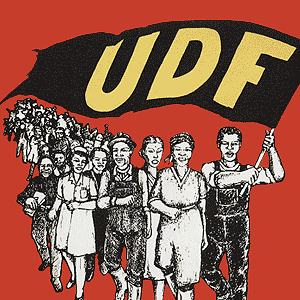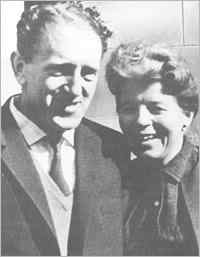Related Research Articles

Walter Max Ulyate Sisulu was a South African anti-apartheid activist and member of the African National Congress (ANC), serving at times as Secretary-General and Deputy President of the organization. He was incarcerated at Robben Island, where he served more than 25 years' imprisonment.
Raymond Mphakamisi Mhlaba was an anti-apartheid activist, Communist and leader of the African National Congress (ANC) also as well the first premier of the Eastern Cape. Mhlaba spent 25 years of his life in prison. Well known for being sentenced, along with Nelson Mandela, Govan Mbeki, Walter Sisulu and others in the Rivonia Trial, he was an active member of the ANC and the South African Communist Party (SACP) all his adult life. His kindly manner brought him the nickname "Oom Ray".

The Defiance Campaign against Unjust Laws was presented by the African National Congress (ANC) at a conference held in Bloemfontein, South Africa in December 1951. The Campaign had roots in events leading up the conference. The demonstrations, taking place in 1952, were the first "large-scale, multi-racial political mobilization against apartheid laws under a common leadership."
Alexandra, informally abbreviated to Alex, is a township in the Gauteng province of South Africa. It forms part of the City of Johannesburg Metropolitan Municipality and is located next to the wealthy suburb of Sandton. It is commonly known as "Gomora" among local residents. Alexandra is bounded by Wynberg on the west, Marlboro and Kelvin on the north, Kew, Lombardy West and Lombardy East on the south. Alexandra is one of the poorest urban areas in the country. Alexandra is situated on the banks of the Jukskei River. In addition to its original, reasonably well-built houses, it also has a large number of informal dwellings or "shacks" called imikhukhu.
The Treason Trial was a trial in Johannesburg in which 156 people, including Nelson Mandela, were arrested in a raid and accused of treason in South Africa in 1956.

The United Democratic Front (UDF) was a South African popular front that existed from 1983 to 1991. The UDF comprised more than 400 public organizations including trade unions, students' unions, women's and parachurch organizations. The UDF's goal was to establish a "non-racial, united South Africa in which segregation is abolished and in which society is freed from institutional and systematic racism." Its slogan was "UDF Unites, Apartheid Divides." The Front was established in 1983 to oppose the introduction of the Tricameral Parliament by the white-dominated National Party government, and dissolved in 1991 during the early stages of the transition to democracy.

Johannes "Joe" Modise was a South African political figure. He helped to found Umkhonto we Sizwe, the military wing of the African National Congress, and was its longest serving Commander in Chief, deputised at different points in time by Joe Slovo and Chris Hani. Modise headed MK for a 25-year period, from 1965 to 1990. He served as South Africa's first black Minister of Defence from 1994 to 1999 and led the formation of the post-independence defence force.
Philemon Pearce Dumasile Nokwe, known as Duma Nokwe, was a South African political activist and legislator, and served as the Secretary-General of the African National Congress from 1958 to 1969.
Vuyisile Mini was a unionist, Umkhonto we Sizwe activist, singer and one of the first African National Congress members to be executed by apartheid South Africa.

Ronald Kasrils is a South African politician, Marxist revolutionary, guerrilla and military commander. He was Minister for Intelligence Services from 27 April 2004 to 25 September 2008. He was a member of the National Executive Committee (NEC) of the African National Congress (ANC) from 1987 to 2007 as well as a member of the Central Committee of the South African Communist Party (SACP) from December 1986 to 2007.

Lionel "Rusty" Bernstein was a Jewish South African anti-apartheid activist and political prisoner. He played a key role in political organizations such as the South African Communist Party (SACP) and the African National Congress (ANC). He helped form the Congress of Democrats to bolster white participation in the ANC, and he brought its allies together to establish a Congress of the People, working closely with Nelson Mandela.

Thomas Titus Nkobi was a senior leader of the South African African National Congress (ANC) and a key figure in the Anti-Apartheid movement. Until his death he was the Treasurer General of the ANC and also its Member of Parliament.

Internal resistance to apartheid in South Africa originated from several independent sectors of South African society and took forms ranging from social movements and passive resistance to guerrilla warfare. Mass action against the ruling National Party (NP) government, coupled with South Africa's growing international isolation and economic sanctions, were instrumental in leading to negotiations to end apartheid, which began formally in 1990 and ended with South Africa's first multiracial elections under a universal franchise in 1994.
Billy Nair was a South African politician, a member of the National Assembly of South Africa, an anti-apartheid activist and a political prisoner in Robben Island.

The Workers and Socialist Party (WASP) is a Marxist and Trotskyist political party in South Africa affiliated to International Socialist Alternative.
Jack Simons was a South African university academic and anti-apartheid activist.
The potato boycott of 1959 was a consumer boycott in Bethal, South Africa during the Apartheid era against slave-like conditions of potato labourers in Bethal, Transvaal. The boycott started in June 1959 and ended in September 1959. Prominent figures of the movement included Gert Sibande, Ruth First, Michael Scott and Henry Nxumalo.

Annie Silinga (1910-1984) was a South African anti-pass laws and anti-apartheid political activist. She is known for her role as the Cape Town African National Congress Women's League President, a leader in the 1956 anti-pass Women's March to the Union Buildings in Pretoria, South Africa and the only African woman in the 1956 treason trial in South Africa.
John Kgwana Nkadimeng was a South African politician, anti-apartheid activist and South African ambassador in Cuba. Nkadimeng was awarded the Order of Luthuli in 2003 by President Thabo Mbeki and Isitwalandwe in 2019 by President Cyril Ramaphosa.

The Metal and Allied Workers' Union (MAWU) was a trade union representing workers in metalworking, engineering and related industries in South Africa.
References
- 1 2 3 4 5 6 7 8 9 "Moses Jongizizwe Mayekiso". South African History Online. Retrieved 5 December 2013. From Who's who in South African Politics, Vol. 4, pp. 175–176
- 1 2 3 Kraft, Scott (25 April 1989). "S. African Union Leader, 4 Others Acquitted of Treason". Los Angeles Times . Retrieved 5 December 2013.
- ↑ Parks, Michael (4 April 1985). "Bishop Tutu Marches, Defies S. Africa Police". Los Angeles Times. Retrieved 6 December 2013.
- ↑ Belinda Bozzoli, Theatres of Struggle and the End of Apartheid (2004), page 118.
- ↑ Belinda Bozzoli, Theatres of Struggle and the End of Apartheid (2004), page 117.
- ↑ Parks, Michael (26 May 1987). "S. Africa Sentences Cleric to 11 Years for Terrorism". Los Angeles Times. Retrieved 6 December 2013.
- 1 2 Bell, Terry (26 September 2008). "'Hell' for dissidents". Independent Online . Retrieved 9 December 2013.
- ↑ Glenn Adler and Doris Suarez, Union Voices: Labor's Responses to Crisis (1993), page 245.